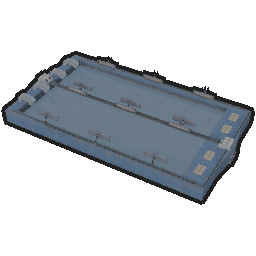Evaporation Pond (Heated): Difference between revisions
m Update parameters in infobox machine |
Corrected first paragraph and changed some of the opinion in the second. |
||
| Line 15: | Line 15: | ||
| Variants = [[Evaporation Pond]] | | Variants = [[Evaporation Pond]] | ||
}} | }} | ||
The '''Evaporation Pond (Heated)''' is one of only two machines which can produce {{infoicon|Salt}}, a critical ingredient in {{infoicon|Glass Mix}} and a requirement to manufacture {{infoicon|Glass}}. The other is the [[Evaporation Pond]] variant carries a | The '''Evaporation Pond (Heated)''' is one of only two machines which can produce {{infoicon|Salt}}, a critical ingredient in {{infoicon|Glass Mix}} and a requirement to manufacture {{infoicon|Glass}}. The other is the [[Evaporation Pond]] variant carries a 33% lower {{infoicon|Worker|ui-yes}}, 50% lower [[Maintenance]], and no {{infoicon|Electricity}} cost, but also has a 50% lower throughput. Compared to a pair of unheated [[Evaporation Pond|Evaporation Ponds]], one Evaporation Pond (Heated) consumes 60 kW to save two {{infoicon|Worker|ui-yes}}, one [[Maintenance]] and a significant amount of space. | ||
Salt can be created using either {{infoicon|Seawater}} from a [[Seawater Pump]] or from the {{infoicon|Brine}} byproduct of a [[Thermal Desalinator]]. | Salt can be created using either {{infoicon|Seawater}} from a [[Seawater Pump]] or from the {{infoicon|Brine}} byproduct of a [[Thermal Desalinator]]. If significant amounts of {{infoicon|Brine}} are available from desalination, this is significantly cheaper than creating salt directly from {{infoicon|Seawater}}, though [[Thermal Desalinator|Thermal Desalinators]].are very expensive to run. | ||
== Recipes == | == Recipes == | ||
Revision as of 16:56, 29 August 2022
| Construction | |
| Workers | |
| Electricity | |
| Maintenance | |
| Footprint | 15x9 |
| Required Research | Salt Production |
| Designation | Water Extraction & Processing |
| Variants | Evaporation Pond |
The Evaporation Pond (Heated) is one of only two machines which can produce Salt, a critical ingredient in Glass Mix and a requirement to manufacture Glass. The other is the Evaporation Pond variant carries a 33% lower Worker, 50% lower Maintenance, and no Electricity cost, but also has a 50% lower throughput. Compared to a pair of unheated Evaporation Ponds, one Evaporation Pond (Heated) consumes 60 kW to save two Worker, one Maintenance and a significant amount of space.
Salt can be created using either Seawater from a Seawater Pump or from the Brine byproduct of a Thermal Desalinator. If significant amounts of Brine are available from desalination, this is significantly cheaper than creating salt directly from Seawater, though Thermal Desalinators.are very expensive to run.
Recipes
| |
| |
| * Only available in the Supporter Edition | |
